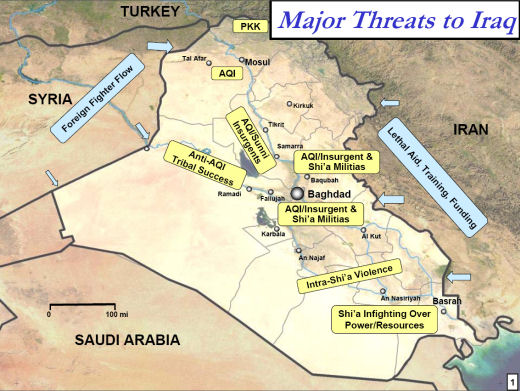Our current course is hard. The alternatives are far worse.
Ambassador Crocker
I don’t question that Ryan Crocker believes what he said. In fact, I was very impressed with his clear assessment of the Iraqi ethos…
Evaluating where Iraqis are today only makes sense in the context of where they have been. Any Iraqi under 40 years of age — and that is the overwhelming majority of the population — would have known nothing but the rule of the Baath Party before liberation 4.5 years ago. Those 35 years were filled with crimes against humanity on every scale. Saddam Hussein ruled without mercy, not hesitating to use lethal force and torture against even those in his inner circle. His genocidal campaign against the Kurds and savagery toward southern Shia are well known. But he also used violence and intimidation as tools in the complete deconstruction of Iraqi society. No organization or institution survived that was not linked in some way to regime protection. He created a pervasive climate of fear in which even family members were afraid to talk to one another. This is the legacy that Iraqis had as their history when Saddam’s statue came down on April 9, 2003. No Nelson Mandela existed to emerge on the national political scene. Anyone with his leadership talents would not have survived. A new Iraq had to be built almost literally from scratch. And the builders, in most cases, were themselves reduced to their most basic identity, ethnic or sectarian. Much progress has been made, particularly in building an institutional framework where there was none before. But rather than be in a period in which old animosities and suspicions were overcome, the past 18 months have further strained Iraqi society. The sectarian violence of 2006 and early 2007 had its seeds in Saddam’s social deconstruction and it had dire consequences for the people of Iraq, as well as its politics. Extensive displacement and widespread sectarian killings by al-Qaida and other extremist groups have gnawed away at the already frayed fabric of Iraqi society and politics. It is no exaggeration to say that Iraq is and will remain for some time to come, a traumatized society. It is against this backdrop that development in Iraqi national politics must be seen. Iraqis are facing some of the most profound political, economic and security challenges imaginable. They’re not simply grappling with the issue of who rules Iraq, but they’re asking what kind of country Iraq will be, how it will be governed, and how Iraqis will share power and resources among each other.

So, while his assessment is focused on the Iraqi internal struggle, he joins the Bush Administration in blaming these ‘evil’ intrusions from the outside. Evil al Qaeda, Evil Iran, Evil Syria, Evil Sunnis, Evil Shiites. Who are the not-Evil people in Iraq? The ones that agree with us? No, the ones that aren’t violent. There aren’t any Iraqis marching in the street demanding American Democracy. The idea is that where we want them to go is the right direction and that we should protect them from Evil outsiders until they figure it out and go the way we want them to go. Where is the evidence for that trajectory? Where is the real indicator that supports that idea? How do we know that this is only the wish of a naive and incompetent President of the United States? That evidence was not in Crocker’s speech except as vague indicators that hardly carry the argument.
Sorry, the comment form is closed at this time.